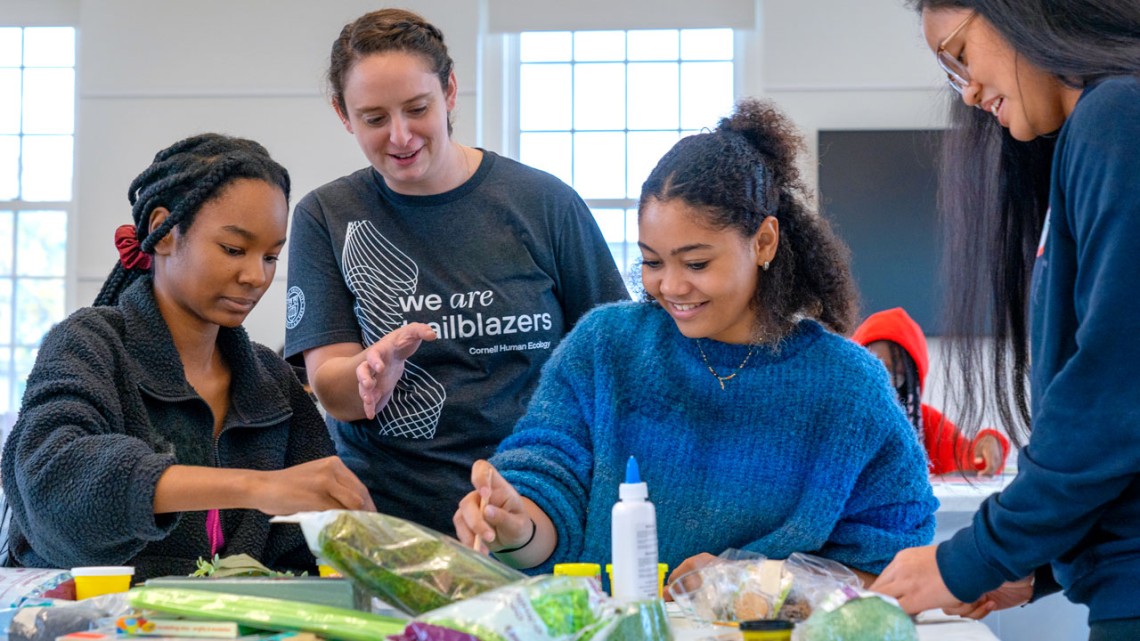
Ithaca teens share their ideas for an inclusive community space with doctoral candidate Julia Jaffe (second from left). Jaffe led a two-part workshop with local middle and high school students through the Einhorn Center’s Science and Technology Entry Program.
Engaging youth leads to more inclusive public spaces
By Marisa LaFalce
Outside of the token skate park, the diverse needs of New York state teens are often ignored when planners design public spaces. A new collaboration between a College of Human Ecology (CHE) professor and Cornell Cooperative Extension (CCE) seeks to put an end to that.
Through her research, Janet Loebach, the Evalyn Edwards Milman Assistant Professor in Child Development, has found that engaging youth in assessing and designing public spaces intended for them leads to better, more useful spaces while increasing their capability and sense of self-efficacy.
Loebach worked with 4-H programs in New York’s Monroe, Orange and Rockland counties to understand the needs of urban and rural youth. Based on her findings, she created an assessment tool that youth can use to evaluate and improve their community recreation settings and greenspace.
Now she is partnering with Kimberly Kopko, associate director of CCE, to launch a joint research and extension project that will reach adolescents – and their parents – in all of New York’s counties.
“We expect that youth who participate in this program will be positively impacted through increased agency, skill development and the opportunity to advocate for changes to their environments,” Loebach said.
It’s the first project to combine CCE’s 4-H youth empowerment programs with its parent education outreach. It’s supported by federal funds received from the National Institutes for Food and Agriculture and the U.S. Department of Agriculture.
“Post-pandemic, the need to strengthen families through research-based programming is more important than ever before,” said Kopko, who directs the Parenting Project, which provides research-based resources for parent educators in the CCE system.
The three-year project will provide young people from diverse locations across the state with the opportunity to evaluate community spaces through their own lens. Project leaders will then engage youth and their parents to plan and advocate for youth-friendly changes to local public spaces, including parks. Kopko and Loebach will work with 4-H participants, extension associates and parents to refine the assessment tool, help young people to develop Youth Action Plans for community improvement and design communication tools for expressing their needs to decision makers.
“I am thrilled to receive this funding because it provides direct resources for translational assets designed to make communities more youth-friendly,” Loebach said.
The research will also examine caregiver attitudes toward outdoor play and identify potential barriers to the use of community spaces. Kopko and Loebach want to further support positive youth development by increasing parents’ understanding of development principles and the impact of community environments.
They plan to develop a toolkit designed to help teens, parents and educators engage youth in community assessment and planning activities in their municipality. The program will be rolled out with 4-H across the state and could provide a template for national planning.
“This project is timely, innovative and a great example of how emerging research can be enhanced through engagement with extension,” said Andrew Turner ’88, M.P.S ‘93, director of CCE and associate dean of CHE. “The project aligns with our broader 4-H goals of positive youth development, specifically incorporating youth voice and creating opportunities for youth to develop a sense of belonging and engagement with peers, caring adults and with their community.”
Marisa LaFalce is a communications assistant in the College of Human Ecology.
Media Contact
Get Cornell news delivered right to your inbox.
Subscribe
